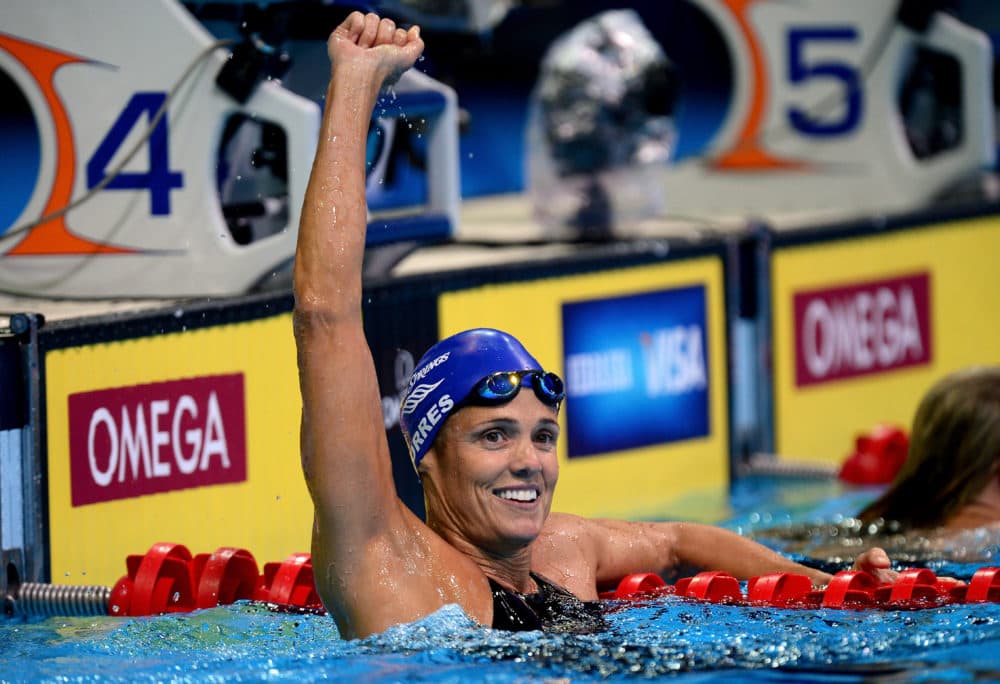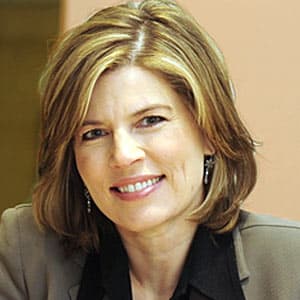Advertisement
The Comeback Story Of Olympic Swimmer Dara Torres

Swimmer Dara Torres won 12 Olympic medals over a nearly 25-year span from age 17 to 41.
But success in the pool early on in her career hid struggles with a serious eating disorder. Torres talks about that in-depth for the first time in a documentary that airs on the SEC Network on Monday called “Once Upon A Comeback.”
As a swimmer at the University of Florida during the ‘80s, Torres says she faced pressure from coaches, particularly Randy Reese, to lose weight. At the time, the coaches didn’t know a lot about eating disorders, she says.
One coach wanted the team to look intimidating to competitors on the starting blocks and set a weight goal for the swimmers to meet, she says. If someone didn’t make weight, they had to do extra workouts.
“For me personally, having come from a background where I've never trained like that before in my life, to have to do extra workouts was just, that wasn't going to happen for me,” she says. “And one thing led to another. I sort of got in this habit of bingeing and purging in my freshman year, and that's kind of how it all started and just sort of snowballed from there.”
The coaches weighed the girls right on the pool deck, as Torres describes in the film, and sometimes the swimmers would break down in tears if they didn't make weight. The intense pressure to make weight came from an inner desire to please her coaches, she says.
The cycle of bingeing and purging took over Torres’ life and psyche — but now she views the difficult experience as a lesson.
“It was obviously a very dark time in my life and I wouldn't wish that upon my worst enemy,” she says. “But yet I learned a lot from it and it made me the person who I am today.”
Advertisement
Torres says she tried talking to a male team doctor at the university about her struggles, but the conversation ended with him handing her information on eating disorders.
After she graduated college, she went to get a physical and the doctor asked her if she’s ever binged and purged. Torres said no, but later called the doctor back and admitted she had a problem.
The first step to recovery was opening up about her disorder, she says. Her advice to people struggling with eating disorders is to talk about it.
“I knew I had a lot of work to do after that but it was a huge relief to get it off my shoulders after four years of only me knowing that I had this issue,” she says.
Torres swam in the Olympics in Seoul in 1988, Barcelona in 1992, Sydney in 2000 and Beijing in 2008. When the time to train for Beijing arrived, Torres was pregnant, in her 40s and swimming for exercise.
She says she received invitations to swim in a few meets, and then people started to ask, “Wouldn't it be great to see a middle-aged person in the Olympic Games?” Since she loves a challenge, Torres decided to go for gold once again.
The swimmer ended up winning three silver medals in Beijing. As she trained, Torres kept the goal of winning a gold medal in her head.
“I kept that thought with me every single day for the almost two years after that I trained for the Olympic trials and Olympic Games,” she says. “And I really think the power of positive thinking can play a role in what you do in your life.”
Interview Highlights
On how she started swimming
“Well, I have four older brothers, and I was very competitive the minute I was born. It's like, who could be the first one in the car? Who could be the first one done at the dinner table? Just always competing with them. Whatever they would do, I would do. So the minute they started on a swim team, my mom had me in the stands. That didn't go very well because I had a lot of energy. And I think back then they called it hyperactivity, but I'm sure I had ADD. And she put me in the pool just to get the energy out and not have it all around her and just focus it somewhere. So I started swimming and just fell in love with the sport.”
On whether swimming came easy to her
“It really did. I really could just get up on the starting blocks and do the start into the water and swim fast and no big deal. And I think that all changed when I started to notice changes in my body, started to become more of a woman, and realized that I actually have to work hard to be fast. It just doesn't come easy anymore. “
On if she left the sport satisfied after she didn’t qualify for a sixth Olympic team in 2012
“I really did. It's funny because when I got out of the pool after those Olympic trials and I missed the team by nine one-hundredths of a second, I looked in the stands. I saw my daughter crying and I saw my mom crying. I'm like, ‘Oh, my gosh, I have to go over and console them.’ And, you know, my mom, obviously, she was upset because she's my mom and she wanted to see me make another Olympic team, but my daughter, I'm like, ‘Tessa, What's wrong? Are you OK?’ She's like, ‘Now I don't get to go to London and see Michael Phelps and Ryan Lochte.’ I'm like, oh, my gosh, she's starting way too early, you know? So it was kind of funny. It was a little bit of a role reversal of, you know, me having to console my mom. But I was OK. I knew that the time that I did Olympic trials, my sixth Olympic trials, was the second-fastest time I've ever done at trials. But the girls are getting faster and I couldn't give it anything else. I gave it all I had.”
On what she tells her daughter about body image and her experience with eating disorders
“I continuously tell her how beautiful she is on the inside and out and not to base everything off of food. And just to make sure that when you want to eat stuff that, you know, you're maybe not supposed to have, eat it in smaller portions and you'll be fine.”
Alex Ashlock produced and edited this interview for broadcast with Todd Mundt. Allison Hagan adapted it for the web.
This segment aired on February 22, 2021.
